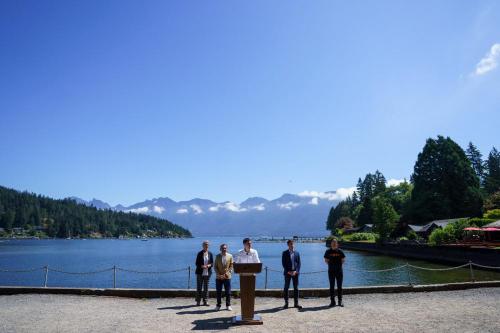
Bowen Island, British Columbia
Canadians are proud of our oceans. With the longest coastline in the world, marine and coastal areas are essential to our livelihoods and our economy right across the country. Since it was launched in 2016, the Oceans Protection Plan has strengthened protections for our coasts and wildlife, improved marine traffic and incident management, and advanced partnerships with Indigenous communities.
The Prime Minister, Justin Trudeau, today announced the next phase of Canada’s Oceans Protection Plan. With the new investment of $2 billion over nine years, announced in Budget 2022, Canada will establish 15 new measures to expand ocean protection initiatives to more regions and better proactively combat emerging threats to marine safety, while continuing or expanding 39 existing initiatives. This new funding is in addition to the $1.5 billion initially announced in 2016 and brings the total invested in support of the plan to $3.5 billion.
The renewed and expanded plan will help make further progress to:
- Enhance the protection and restoration of vulnerable marine ecosystems and wildlife;
- Improve the efficiency, safety, and sustainability of Canada’s marine supply chains and mitigate their impacts on the environment, including by advancing research on marine pollution, ecosystems, and wildlife;
- Better manage marine traffic navigation off our coasts and marine incidents of all types; and
- Advance partnerships and training opportunities for Indigenous and coastal communities to incorporate their expertise and experiences in various aspects of marine safety and ecosystem protection.
The renewed and expanded plan builds on the first, successful iteration, which delivered real results on key promises across the country. For example, since 2016, the government re-opened important incident response centers, like the Canadian Coast Guard Maritime Rescue Sub-Centre St. John’s and the new permanent station in Victoria. We also took action to protect species at risk, including the Southern Resident Killer Whale and funded initiatives to protect the North Atlantic Right Whale.
The Oceans Protection Plan is a Canadian success story. When Indigenous Peoples, industry, communities, academia, and government work together to protect our environment, grow our economy, and support good jobs across the country, we deliver real results. A renewed and expanded Oceans Protection Plan will keep our oceans and coasts healthy, advance reconciliation, and build a clean future for our children and grandchildren.
Quotes
Quick Facts
- Canada’s ocean economy accounts for approximately $31.65 billion annually in GDP and employs approximately 300,000 Canadians across various industries.
- Marine transportation is among the safest and most cost-effective low-emission ways to move goods.
- Since its launch in 2016, over 50 initiatives have been implemented under the Oceans Protection Plan. These include:
- Opening six Canadian Coast Guard search and rescue stations in British Columbia and Newfoundland and Labrador, and a seasonal inshore rescue boat station in Nunavut, to improve our ability to respond to marine incidents;
- Significantly increasing emergency response capacity with an Indigenous-led Canadian Coast Guard Auxiliary in British Columbia and the expansion of the Auxiliary across the Arctic, emergency tow kits, new vessels, equipment, and training on all three coasts;
- Funding over 60 projects across Canada to restore coastal aquatic habitats that support species like salmon and the endangered Southern Resident Killer Whale;
- Funding 500 projects to remove and dispose of abandoned boats across Canada and making it illegal to abandon your boat in Canada’s waters;
- Supporting 750 individuals, including women, Indigenous Peoples, and Northerners, to graduate from specialized training to qualify for jobs in the marine industry;
- Modernizing Canada’s Ship-source Oil Pollution Fund so that the polluter pays and making unlimited compensation available to those affected by an oil spill;
- Forming a bilateral agreement between Canada and 17 Pacific North Coast First Nations to advance collaborative oceans governance and management of British Columbia’s North Coast; and
- Holding on average one session per day with Indigenous communities across Canada to plan, develop, or execute the Oceans Protection Plan priorities and actions.
- The implementation of the Oceans Protection Plan is a whole-of-government effort, with responsibility shared across Transport Canada, Fisheries and Oceans Canada, the Canadian Coast Guard, Environment and Climate Change Canada, Natural Resources Canada, and Health Canada, with support from Public Services and Procurement Canada and Global Affairs Canada.
- Today’s announcement delivers on the commitment set out in Minister of Transport Omar Alghabra’s mandate letter from December 2021, to launch the next phase of the Oceans Protection Plan to continue efforts to deliver a world-leading marine safety system, increase protection for marine species and ecosystems, and create stronger partnerships with Indigenous and other coastal communities, while strengthening marine research and science.
- In addition to today’s announcement, the government announced in Budget 2022 its intention to propose amendments to the Canada Shipping Act, 2001 and other acts, including to enable the proactive management of marine emergencies and cover more types of marine pollution.
Related Product
Associated Links










Add new comment